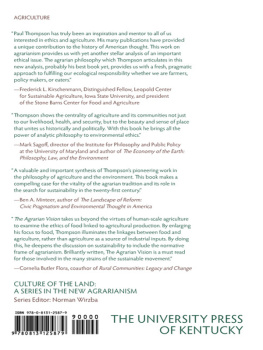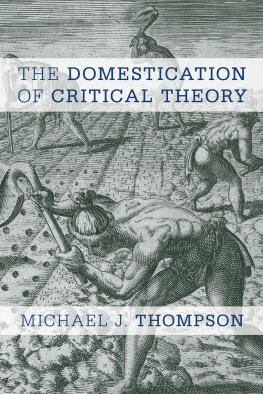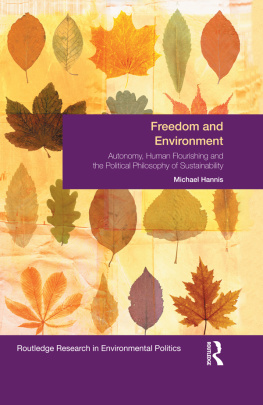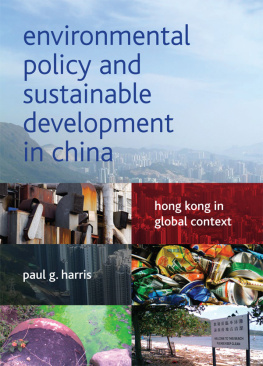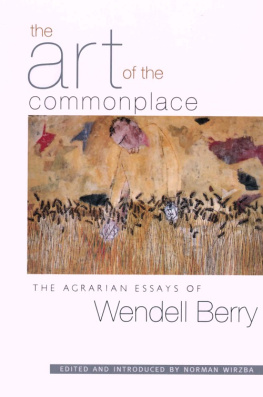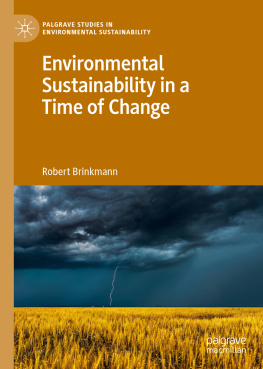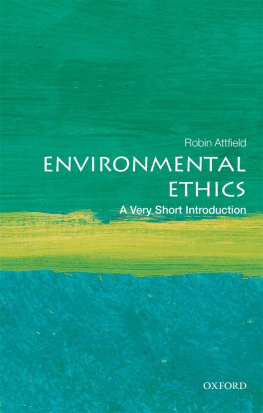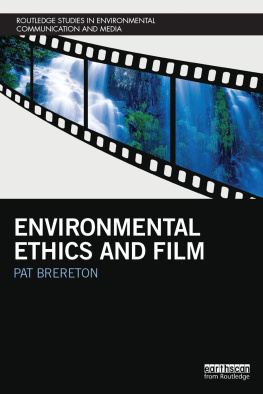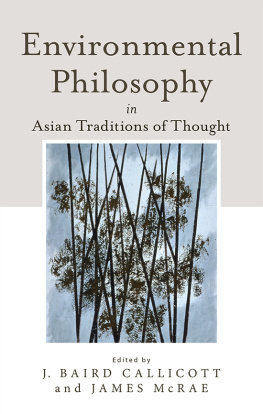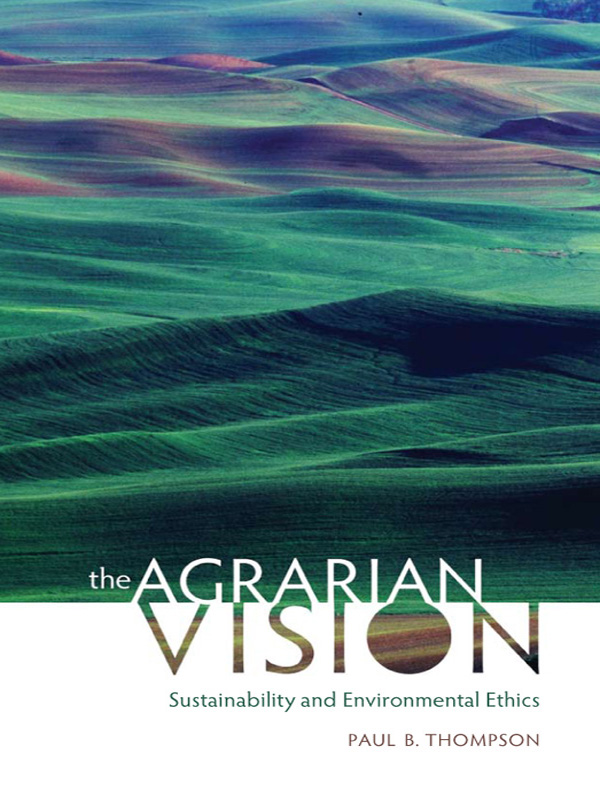Culture of the Land: A Series in the New Agrarianism
This series is devoted to the exploration and articulation of a new agrarianism that considers the health of habitats and human communities together. It demonstrates how agrarian insights and responsibilities can be worked out in diverse fields of learning and living: history, science, art, politics, economics, literature, philosophy, religion, urban planning, education, and public policy. Agrarianism is a comprehensive worldview that appreciates the intimate and practical connections that exist between humans and the earth. It stands as our most promising alternative to the unsustainable and destructive ways of current global, industrial, and consumer culture.
Series Editor
Norman Wirzba, Duke University, North Carolina
Advisory Board
Wendell Berry, Port Royal,
Kentucky Ellen Davis, Duke University, North Carolina
Patrick Holden, Soil Association, United Kingdom
Wes Jackson, Land Institute, Kansas
Gene Logsdon, Upper Sandusky, Ohio
Bill McKibben, Middlebury College, Vermont
David Orr, Oberlin College, Ohio
Michael Pollan, University of California at Berkeley, California
Jennifer Sahn, Orion Magazine, Massachusetts
Vandana Shiva, Research Foundation for Science,
Technology & Ecology, India
Bill Vitek, Clarkson University, New York
Copyright 2010 by The University Press of Kentucky
Scholarly publisher for the Commonwealth,
serving Bellarmine University, Berea College, Centre
College of Kentucky, Eastern Kentucky University,
The Filson Historical Society, Georgetown College,
Kentucky Historical Society, Kentucky State University,
Morehead State University, Murray State University,
Northern Kentucky University, Transylvania University,
University of Kentucky, University of Louisville,
and Western Kentucky University.
All rights reserved.
Editorial and Sales Offices: The University Press of Kentucky
663 South Limestone Street, Lexington, Kentucky 40508-4008
www.kentuckypress.com
14 13 12 11 10 5 4 3 2 1
Library of Congress Cataloging-in-Publication Data
Thompson, Paul B., 1951
The agrarian vision : sustainability and environmental ethics / Paul
B. Thompson.
p. cm. (Culture of the land: a series in the new agrarianism)
Includes bibliographical references and index.
ISBN 978-0-8131-2587-9 (hardcover : alk. paper)
1. Sustainable agricultureUnited States. 2. Environmental
ethicsUnited States. 3. Agriculture and stateUnited States.
I. Title. II. Series: Culture of the land.
S441.T48 2010
630dc22
2010007781
This book is printed on acid-free recycled paper meeting the requirements of the American National Standard for Permanence in Paper for Printed Library Materials.

Manufactured in the United States of America.

Member of the Association of
American University Presses
For Diane Thompson, local food advocate
Acknowledgments
This book is a follow-up to my book The Spirit of the Soil: Agriculture and Environmental Ethics. In response to an invitation from Norman Wirzba and Stephen Wrinn, I assembled a collection of mostly previously published essays and received extremely helpful comments from University Press of Kentucky reviewers. The result bears little resemblance to that original collection. Several proposed chapters were dropped altogether, and two totally new ones were written. Most of the other chapters have been so thoroughly revised and amended as to constitute new works. But assembling and revising those essays took me back to some that had been written more than twenty years ago. I fear that many of the individuals who helped me with those articles have now faded from memory. But I can name several colleagues who have been frequent interlocutors and have helped shape my thinking on sustainability and agrarian ideas for many years. Foremost are Richard Haynes and Jeffrey Burkhardt, fellow conspirators since the beginning of the quest to invent something called agricultural ethics. At about the same time, I met five people from the rural social sciences who became great friends and had a tremendous and continuing influence on my thought. Three of them, Bill Browne, Fred Buttel, and Glenn L. Johnson, have passed on in recent years. Thankfully, I continue to enjoy my interactions with Larry Busch and Kate Clancy. More recent colleagues who have been informal critics of my work include Gary Comstock, Laura Westra, Clark Wolf, Rob Streiffer, Jennifer Welchman, Bryan Norton, Ben Mepham, Michiel Korthals, Peter Sande, and Ben Minteer. Colleagues who have subjected my work to useful criticism in print include Fred Buttel and Larry Busch, as well as Kathryn George, Mora Campbell, Eric Freyfogle, and Carolyn Raffensperger.
This project really got under way in connection with a National Science Foundation grant awarded in 1992 when I was on the faculty at Texas A&M University. I worked closely with a group of colleagues there in the early stages, and each of them is responsible for some part of my current thinking on sustainability. They are, in alphabetical order, Harry Cralle, Wesley Dean, Bruce Dickson, Susan Gilbertz, Adolf Gunderson, Thomas Hilde, Jimmy Killingsworth, Alex MacIntosh, Tarla Rae Peterson, Gary Varner, and Don Vietor. Additional financial support was provided by the W. K. Kellogg Foundation through its gift of funds to endow the W. K. Kellogg Chair in Agricultural, Food, and Community Ethics at Michigan State University. In addition to anonymous reviewers, the manuscript was read (at various stages in its development) by MSU colleagues Sandra Batie and David Wright. All these reviewers made exceedingly helpful suggestions, though I must admit I could not incorporate everyone in the final text. Invaluable technical assistance was provided by Ellen Link, Linda Lotz, and Julie Eckinger. I, of course, maintain responsibility for any remaining flaws.
Although all the previously published materials in this book were extensively revised, I would like to thank the original publishers for permission to reprint portions of the following essays:
: The Reshaping of Conventional Farming: A North American Perspective, Journal of Agricultural and Environmental Ethics 14 (2001): 21729.
: Agrarian Values: Their Future Place in U.S. Agriculture, in Visions of American Agriculture, ed. W. Lockeretz (Ames: Iowa State University Press, 1997), 1730.
: Agriculture and Working-Class Political Culture: A Lesson from The Grapes of Wrath, Agriculture and Human Values 24 (2007): 16577.
: Farming as Focal Practice, in Technology and the Good Life? ed. E. Higgs, A. Light, and D. Strong (Chicago: University of Chicago Press, 1999), 16681.
: The Philosophical Rationale for U.S. Agricultural Policy, in U.S. Agriculture in a Global Setting: An Agenda for the Future, ed. M. A. Tutwiler (Washington, DC: Resources for the Future, 1988), 3444.
: The Social Goals of Agriculture, Agriculture and Human Values 3, no. 4 (1986): 3242.
: Sustainability as a Norm, Techn: Technology in Culture and Concept 2, no. 2 (1997): 7594.
Introduction
Sustainability and Agrarian Ideals
How can we make our society and our lives more sustainable? What would it mean for us to try? When Thomas Jefferson assumed office as the third president of the United States, he faced a sustainability crisis of his own. The new republic was straining to recover from debts incurred while opposing the British in the Revolutionary War. Although historians of the United States seldom mention the fact, many colonials chose to relocate their businesses after the Revolution, seeking a more stable economic and political environment. The United States chief international ally was France, which had endured a decade of revolution itself. Jefferson not only had to find some way to rebuild the economy of the new nation; he also had to do it in an manner that would fend off predatory European states still looking to recolonize the North American continent, should the government of the United States falter. What is more, events in France had demonstrated how experiments in democracy could abuse power as well as how they could fail. Could the American experiment in democracy survive? Was it sustainable?

